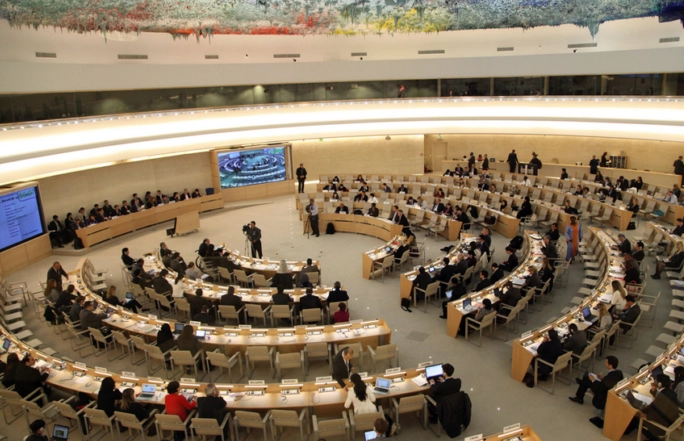On November 15, Cuba failed its Universal Periodic Review (UPR) at the United Nations Human Rights Council in Geneva, Switzerland. A significant portion of the recommendations made to the Cuban state focused on the complex human rights situation, affecting not only civilians and political figures but also those who once served as Havana’s vocal defenders for many years.
Had the selection mechanisms of the Human Rights Council been different, it might have thwarted Cuba’s re-election until 2026. Most scathing recommendations came from democratic states in Latin America and Europe, exposing Cuba’s human rights violations, which is very positive. These are countries with which Cuban authorities do not have as extensive negotiation capabilities as they do with autocratic states like North Korea or Iran. These and other autocracies, along with some democracies with left-wing governments and allies of Cuba, limited themselves to making positive recommendations. In total, more than 144 countries spoke out regarding the human rights situation in the Cuban context.
Topics like repression of activists and human rights defenders, independent journalists and political opponents—often through the use of offenses defined in the Penal Code of 2022—dominated the recommendations. Other points were raised concerning the need to ratify various human rights treaties, especially the international covenants on civil and political rights and economic, social, and cultural rights; ensure judicial independence; release individuals detained for political reasons, among others.
For example, Sweden voiced concern about detentions and excessively long prison sentences against people that participated in the July 2021 protests and restrictions on freedom of expression and peaceful assembly. Sweden also urged Cuba to allow independent observers free access to trials and prisons.
The Netherlands called for an end to harassment, repression, arbitrary arrests and detentions of some civil-society members, and to cease the practice of arbitrarily detaining journalists, opposition members, human rights defenders, religious figures and others seeking to exercise their human rights and fundamental freedoms. It also urged the release of nearly 1,000 people unjustly or arbitrarily detained, the adoption of a legal framework ensuring the independence of judicial bodies, and the end to the single-party system to allow free and fair elections.
Other democratic states like France, Slovakia, Slovenia, Sweden, Switzerland, Ukraine, the United Kingdom, Australia, Belgium, the Czech Republic, Romania, Italy, Ireland, Poland, Finland, and Germany demanded an end to repression against journalists, artists, and independent activists. Norway recommendedCuban authorities to refrain from using the new Penal Code to criminalize civil society actors and individual voices critical of the authorities. Similar statements were made by Spain, the United Kingdom, Australia, and Canada.
It is noteworthy that Italy called for ensuring freedom of opinion and expression and the right to peaceful assembly, as well as safeguarding the free and independent activity of human rights defenders and journalists. However, it welcomed the enactment of the 2019 constitutional text, which enshrines the Communist Party of Cuba (PCC) as the only one with legal status in Article 5. The Lithuanian delegation was more direct, expressing alarm about the expansion of crimes punishable by the death penalty in the 2022 Penal Code compared to its predecessor from 1989. The Baltic country called for ensuring freedoms of assembly, peaceful association, opinion, and expression and releasing all political prisoners, including minors.
In the case of Latin American countries, one of the most assertive positions was taken by Peru. The country recommended ensuring that human rights defenders enjoy a safe and appropriate environment and that any act of harassment, repression or intimidation should be thoroughly investigated. The Peruvian state also recommended explicitly prohibiting discrimination on grounds of political opinion or social origin in employment. In this regard, Ecuador called for preventing and ceasing acts of harassment, intimidation, threats and disqualification against human rights defenders, as well as harmonizing legislation on media, broadcasting, the Internet, and cybersecurity with international standards on freedom of expression.
On the other hand, it is noteworthy that some Latin American countries politically close to Cuba made critical recommendations, albeit in a less direct manner, echoing demands from independent civil society organizations unrelated to the Cuban government. In this regard, Mexico recommended classifying femicide as a crime. Meanwhile, Brazil called for strengthening programs for food production and distribution to ensure food and nutritional security for individuals in Cuba, especially women, children, and those deprived of liberty. Similarly, Brazil addressed the issue of violence against women and urged the Cuban government to establish an independent human rights body. Panama concurred with this last recommendation.
As expected, Colombia did not adopt a critical stance and only urged the Cuban state to make progress in preventing teenage pregnancies. African countries, in turn, expressed gratitude for Cuba’s programs against racism. However, it is worth highlighting that these favorable statements toward Cuba are negotiated before its report presentation to the Human Rights Council. Therefore, it is crucial to focus on recommendations from democratic states, with which Cuban authorities lack extensive negotiation capabilities compared to their allies. These recommendations reveal the human rights violations in Cuba, aligning more closely with the country’s actual situation and the work of civil society organizations not controlled by the PCC elite.
Certainly, the UPR is not the ideal mechanism to condemn human rights violations in Cuba. The fact that the member states of the Human Rights Council are elected by the UN General Assembly allows several allies of the Havana government to participate in this examination. Nevertheless, the reminder from many democracies to the Cuban state about its human rights violations is crucial as it sends a clear message: we are watching, and we support the demands of independent civil society. This vigilance is what causes Cuba to suspend time and time again.
*Translated by Ricardo Aceves from the original in Spanish.













